In February, Boat International interviewed Ernesto Bertarelli, President of Alinghi, the America's Cup Defender, who for the past seven months has been embroiled in a legal battle with BMW Oracle Racing's Larry Ellison over the future of the America's Cup...
How long do you plan to remain involved in the America's Cup?
I will remain involved as long as I can contribute and have the energy for it, and can help take the Cup forward, but it will certainly not be for ever, it is very demanding and I am fairly young still. There are many more things I want to do. Sailing is my passion. It's fun. I've done this for my love of the sport, but I don't see myself being a Bernie Ecclestone, as someone who lives off the sport. I definitely don't have that ambition.
It's surprising to hear you say that don't want to be like Bernie Ecclestone? After all, you've made the Cup more commercially viable.
I think that for the America's Cup to be viable it needs to ultimately be more affordable, it needs to reduce its costs, but we're a long from a point where anyone is going to make any money from it. I certainly don't see myself doing so. I'm pleased that sailors can earn a decent living, but the people who invest in the sport, the team owners are losing money. I've lost a lot of money doing it, but I'm not doing it because of the money, I'm doing it because I love it.
I don't want to be a Bernie Ecclestone. I think the people who have that perception of me are those who would like to see the status quo, or rather bring the Cup back to what it used to be, which is a sport where the richer team wins, rather than the better team.
The Ecclestone comparison is not necessarily a derogatory one though, is it? He has done a lot of good for Formula One motor racing as well as made a lot of money from it...
Yes, but I don't have that ambition. I don't want to be seen as controlling the sport, and controlling the America's Cup. I have contributed to part of its history by winning it and taking it to Europe. As long as I'm asked to attend to these duties that winning the Cup brings, I will try to do my best. But in no way do I want to secure any right or ownership of the Cup, whereas my understanding of Formula One is that Bernie has ultimate control over it.
I think the America's Cup is ultimately a yacht club event. Yacht clubs do need owners of teams and owners of boats to finance the sport of sailing. I am the owner of a team. My open letter in December did raise a few issues, highlighting the fact that there is a need for change: the America's Cup needs a permanent event authority providing certainty for teams and venues to plan ahead, it needs a sustainable financial model through cost containment and it needs to be independent from ordinary courts; problems should be resolved by a sporting authority. I don't think that the Bernie Ecclestone option in Formula One is the one that I would recommend.
When you won the America's Cup for the first time in 2003, you must have loved every moment. Your time as the Defender must seem a good deal more bitter-sweet. Is that how it feels?
No, because every time I've done something for the Cup, I've done it for the sailors, the teams and the sport itself. The vision we had in July of winning the Cup and proposing a new boat and a new format - for those who wanted to hear what we had to say - was about bringing more excitement for the sailors who had been racing the same boats for 20 years and were no longer inspired by them.
The America's Cup needs to have an element of discovery, of research and of engineering, so opening the class up was going to give that opportunity. We thought it was about time for boat designers and sailors to get into a new boat. We thought it could provide more excitement for broadcasters. These boats would provide more excitement and more visual impact. The AC90 class is going to be bigger, faster, better.
The other thing I wanted to do was reduce cost, by getting rid of two-boat testing. You need two teams, double the resources of almost everything to be able to two-boat test. You need a lot of time on the water, consuming perishables, etc. And all that time on the water benefits no one, because no one sees it.
That is what we intended and it is unfortunate that one individual, who has the financial resources to push his weight around, decided that it shouldn't be that way. Ultimately we had 12 teams lined up and several others waiting in the wings, which is an unbelievable result in less than six months. When you project yourself back to 2003/04, we were still arguing the protocol with BMW Oracle six months after we won the Cup in New Zealand.
Regardless of the lawsuit, we had achieved quite a bit, a protocol in place, a large number of potential teams ready to go. Unfortunately Larry has the resources to launch a legal battle, so we're stuck in court.
Where do you hope to be a year from now?
I hope we get out of court and get back to a sensible situation where we can go racing, but I think there is one fundamental issue here. You have to win the Cup to become a trustee. If we are to respect the Deed of Gift - hence not seeing myself as a Bernie Ecclestone - I don't see myself in any position to change the Deed of Gift. I might question the Deed of Gift, in terms of how I think it should adapt to today's world, but for the time being, I have to continue with the Deed of Gift and comply with its governance. It says you have to win the Cup in order to organise the regatta. Under that governance system, one cannot accept that - just because a team that is disgruntled for whatever reason or has enough money to take it to court - the principle should be disregarded.
If Larry wants different rules or a different format, he should win the Cup first. I'm not saying that this principle is right or wrong. That's just what the Deed of Gift says. In my open letter, I was trying to raise some issues to be discussed by Larry and former trustees regarding a review of the Deed of Gift, however for the time being we have to respect the one we have. You might not agree with the constitution, but you have to respect the document. We have a constitution, the Deed of Gift. When you win, you become a trustee. But first you have got to win, and then you can set your own rules and format, and administer the trust. That's where I think we got lost in translation; Larry feels he has a lot more rights than I think he does.
Do you ever have days when you just get sick of this, when you're tempted just to pack up the Cup and post it to Larry?
Sure, because ultimately this thing is charitable work. Every time I run a campaign, it's a lot of money down the drain, tens of millions of euros for no return, simply the reward of the achievement, which I don't regret! I have had a fantastic experience with the Cup, so I can't complain.
But some days it feels like you don't get the respect as the winner and organiser of an event. You think: Why should I do it? There are so many people that have been able to earn a living from it, so many people who enjoy watching it, so many teams ready to go. For these people it's worth it. The problem I have is that across the table from me, is a very rich man, whose views are extremely self-centered, and we are suffering the consequences. That is what ultimately needs to be sorted out. We can't find ourselves in a position where, just because he has a lot of money, he can stop thousands of people going about their business.
Two things I find surprising [about the way people see me], one is the Bernie Ecclestone comparison, and the other is that I want to win at all costs, which I find rather surprising seeing as I helped a team [Emirates Team New Zealand, to whom Bertarelli gave financial assistance in 2004] get there, which I knew would be way more competitive than Larry's team. So it's just nonsense, a lot of public relations work being done on BMW Oracle's side.
You were involved in sailing before the Cup, and presumably you'll still be sailing long after you've left the Cup...
I'm very proud of the creation of a multi-hull class on Lake Geneva, the D35. I was fortunate enough to realise that money is not everything in the sport. I went as far as building the fastest boat on the lake, and won the Bol d'Or many times, which is a great achievement. But as a consequence it killed off the competition, because people couldn't keep up with my spending.
I learned a lesson, one that proved that if you allow for a class where everyone has a chance to appear and grow and develop, it's a lot more rewarding when you win. Last year I won after four years of trying in a fleet of 10 boats, and that was very rewarding. That sacrifice was worth it, because now the class attracts Loïc Peyron, Franck Cammas, Michel Desjoyeaux, all the multihull specialists around the world, not because they earn money but because it's the most competitive racing today.
So, a parable for the America's Cup then...
That was the vision for the Cup in 2009, after the fantastic success in 2007. After proving you can make the sport viable, the next step is making it affordable. You have to address costs, but people with a lot of money don't like that, because they want to use their money to win.
It's unfortunate that the 33rd Protocol wasn't better communicated in the first place. It was easy to interpret it as being very one-sided...
It's not all PR spin, because the facts are there. I did help finance TNZ, I did organise 2007, I did help put together the D35 class after withdrawing the fastest boat from Lake Geneva, so what I find rather frustrating as an individual is that people rather listen to talk, and whatever is said on the internet, rather than looking at what has been done.
The reason why it [the 33rd Protocol] was different to the 32nd Protocol was because we had to manage a different number of concepts. For example, for the 32nd America's Cup, some of the most challenging things to manage were organising team appearances, using TV technology on board, cleaning the areas around the team bases and arranging parking areas, etc. All the housekeeping, which nobody ever sees, is one of the results of what you put in the Protocol. People don't understand that if you don't have a Protocol that says, ‘this is the way you're going to park your boat in the Dársena,' then everyone does what they want. Ultimately the Protocol derives all the documents which govern the entire site. It was the intention of making the day-to-day management easier which spurred some of the changes in the Protocol.
So the Defender is seen as the bad guy. Why? Because the Deed of Gift is written in a certain way. The Defender may not intend to be bad, but the Deed of Gift makes it bad. When Italy wins the Soccer World Cup, they win it, that's the end of it.
Sometimes you must wish the Cup was as simple as that! A straight sporting contest...
That's why I wrote that open letter. Maybe one day someone will address it, maybe not me, but someone has to take on this issue.
What of Louis Vuitton's departure from the Cup?
Louis Vuitton helped tremendously in this campaign by BMW Oracle against Alinghi. Why? Did anybody ever ask why? The reason Louis Vuitton withdrew, and was so venomous about AC Management is that for the first time in the history of their involvement in the America's Cup, they were presented with a bidding process. This bidding process for the rights of the event meant that for the first time in the history of their involvement, they had to pay for it.
But I didn't do it for me, because ultimately for the first time in history we had a net surplus which we shared between the teams. And for the first time we had accounts which were audited by well known external auditors, and the accounts are available for everyone to read.
Louis Vuitton were upset because for the first time they were put into a bidding process, and they realised the AC asset had some value, it was worth some money, and if they wanted to have it, they had to pay for it. So you can imagine, along comes Alinghi, with a professional structure, and they're sitting across the table from other big potential sponsors who are also interested, and they're there saying, ‘Who are these people? This is our event! The Louis Vuitton Cup, we invented it!'
We looked at it, and said, ‘Actually you don't own it, the teams own it, so we're going to sell it to you, and we're going to split the profit between the teams.' It was something that someone had to say to them one day, and when you say that to a group as powerful as Louis Vuitton, they don't like it. So Louis Vuitton would have much preferred to go back to New Zealand, be a little less public, so they could go about running it the way they had previously.
Nobody proclaimed that, for the first time in history, we generated over €60m net income for the event and distributed that to all the participating teams. You know how much was left in the account after we took over the event from New Zealand? A few hundred thousand New Zealand dollars. This is why the cliché about me wanting to be Bernie Ecclestone is so frustrating. It is so far from where I want to be. People think: ‘Ernesto wants to own the Cup.' And I don't.
America's Cup - February 2008, #2
Related Articles

America's Cup - August 2010
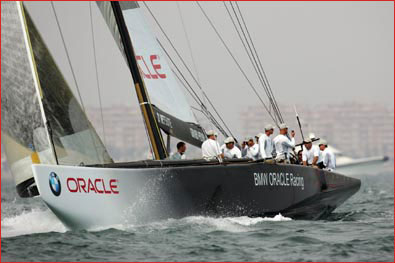 BMW Oracle has been carrying out some extensive TV trials of monohulls and multihulls in Valencia. The aim, says the Defender, is to work out which kind of boat is going to offer the biggest bang for buck in Russell Coutts’s vision of a more media-friendly and commercially-attractive America’s Cup...
BMW Oracle has been carrying out some extensive TV trials of monohulls and multihulls in Valencia. The aim, says the Defender, is to work out which kind of boat is going to offer the biggest bang for buck in Russell Coutts’s vision of a more media-friendly and commercially-attractive America’s Cup...
Read More
 BMW Oracle has been carrying out some extensive TV trials of monohulls and multihulls in Valencia. The aim, says the Defender, is to work out which kind of boat is going to offer the biggest bang for buck in Russell Coutts’s vision of a more media-friendly and commercially-attractive America’s Cup...
BMW Oracle has been carrying out some extensive TV trials of monohulls and multihulls in Valencia. The aim, says the Defender, is to work out which kind of boat is going to offer the biggest bang for buck in Russell Coutts’s vision of a more media-friendly and commercially-attractive America’s Cup...
America's Cup - April 2010
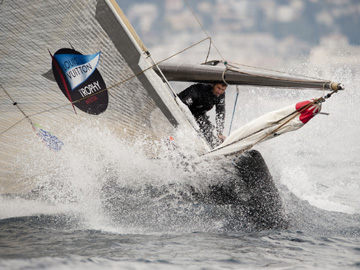 Louis Vuitton has been an integral part of the America’s Cup since the luxury goods company first gave its name to the Louis Vuitton Challenger Series back in Newport 1983. That close association continued up to Valencia 2007, but following Alinghi’s successful defence of the Cup, Louis Vuitton withdrew its backing...
Louis Vuitton has been an integral part of the America’s Cup since the luxury goods company first gave its name to the Louis Vuitton Challenger Series back in Newport 1983. That close association continued up to Valencia 2007, but following Alinghi’s successful defence of the Cup, Louis Vuitton withdrew its backing...
Read More
 Louis Vuitton has been an integral part of the America’s Cup since the luxury goods company first gave its name to the Louis Vuitton Challenger Series back in Newport 1983. That close association continued up to Valencia 2007, but following Alinghi’s successful defence of the Cup, Louis Vuitton withdrew its backing...
Louis Vuitton has been an integral part of the America’s Cup since the luxury goods company first gave its name to the Louis Vuitton Challenger Series back in Newport 1983. That close association continued up to Valencia 2007, but following Alinghi’s successful defence of the Cup, Louis Vuitton withdrew its backing...
33rd America's Cup, Part 5
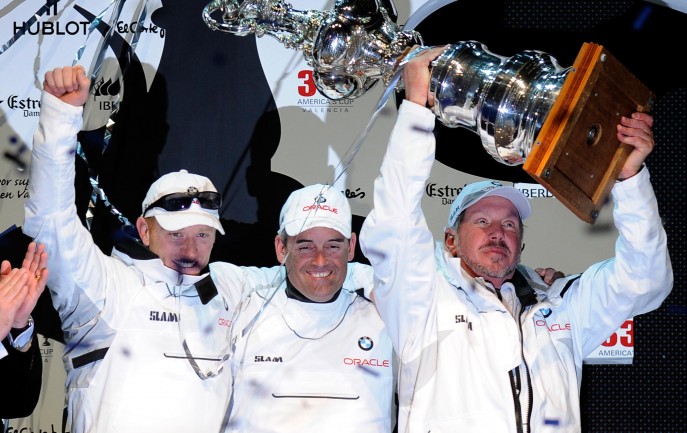 So now we’ve seen the power of wing rigs in action in the America’s Cup, what possibility of a trickledown of technology into other forms of sailing? What about superyachts? BMW Oracle’s design team director Mike Drummond observed, tongue in cheek: “If you go to Wings R Us.com, you can get any size you like.” Of course, this technology is anything but off the shelf, but nor is it new, as Drummond also pointed out: “Wings are not new, they’ve been used by birds for quite a long time...
So now we’ve seen the power of wing rigs in action in the America’s Cup, what possibility of a trickledown of technology into other forms of sailing? What about superyachts? BMW Oracle’s design team director Mike Drummond observed, tongue in cheek: “If you go to Wings R Us.com, you can get any size you like.” Of course, this technology is anything but off the shelf, but nor is it new, as Drummond also pointed out: “Wings are not new, they’ve been used by birds for quite a long time...
Read More
 So now we’ve seen the power of wing rigs in action in the America’s Cup, what possibility of a trickledown of technology into other forms of sailing? What about superyachts? BMW Oracle’s design team director Mike Drummond observed, tongue in cheek: “If you go to Wings R Us.com, you can get any size you like.” Of course, this technology is anything but off the shelf, but nor is it new, as Drummond also pointed out: “Wings are not new, they’ve been used by birds for quite a long time...
So now we’ve seen the power of wing rigs in action in the America’s Cup, what possibility of a trickledown of technology into other forms of sailing? What about superyachts? BMW Oracle’s design team director Mike Drummond observed, tongue in cheek: “If you go to Wings R Us.com, you can get any size you like.” Of course, this technology is anything but off the shelf, but nor is it new, as Drummond also pointed out: “Wings are not new, they’ve been used by birds for quite a long time...
33rd America's Cup, Part 4
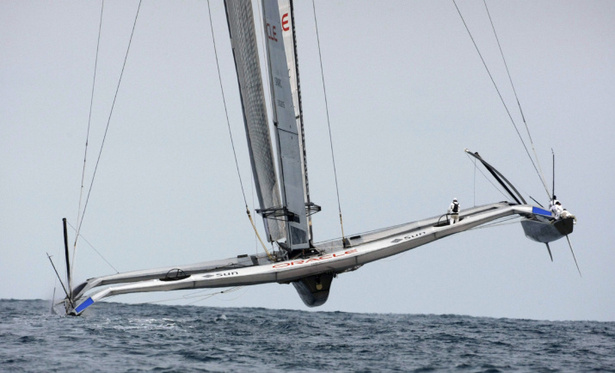 So now we know. Wings trump sails. Theory has always stated that a wing rig should be faster than conventional sails. But the challenge was actually to put a wing rig into practice, to be able to build it in less than six months, and also to manage the logistics of it...
So now we know. Wings trump sails. Theory has always stated that a wing rig should be faster than conventional sails. But the challenge was actually to put a wing rig into practice, to be able to build it in less than six months, and also to manage the logistics of it...
Read More
 So now we know. Wings trump sails. Theory has always stated that a wing rig should be faster than conventional sails. But the challenge was actually to put a wing rig into practice, to be able to build it in less than six months, and also to manage the logistics of it...
So now we know. Wings trump sails. Theory has always stated that a wing rig should be faster than conventional sails. But the challenge was actually to put a wing rig into practice, to be able to build it in less than six months, and also to manage the logistics of it...
33rd America's Cup, Part 3
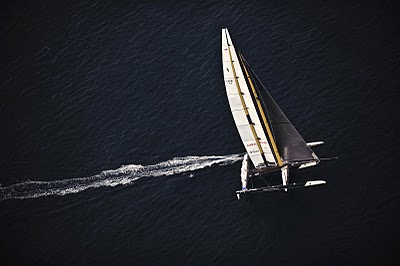 Race 2 was set to take place two days later on the Sunday. It was another long wait while Harold Bennett looked for suitable conditions in which to start the race. The cut-off time of 4pm was just minutes away when Bennett called for the start procedure to begin...
Race 2 was set to take place two days later on the Sunday. It was another long wait while Harold Bennett looked for suitable conditions in which to start the race. The cut-off time of 4pm was just minutes away when Bennett called for the start procedure to begin...
Read More
 Race 2 was set to take place two days later on the Sunday. It was another long wait while Harold Bennett looked for suitable conditions in which to start the race. The cut-off time of 4pm was just minutes away when Bennett called for the start procedure to begin...
Race 2 was set to take place two days later on the Sunday. It was another long wait while Harold Bennett looked for suitable conditions in which to start the race. The cut-off time of 4pm was just minutes away when Bennett called for the start procedure to begin...